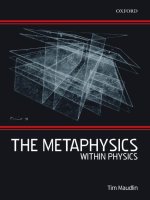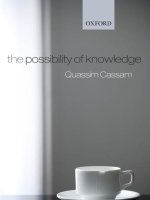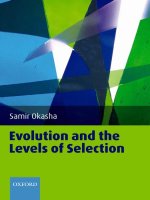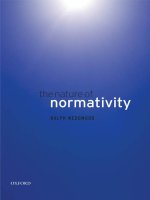- Trang chủ >>
- Khoa Học Tự Nhiên >>
- Vật lý
the metaphysics of knowledge nov 2007
Bạn đang xem bản rút gọn của tài liệu. Xem và tải ngay bản đầy đủ của tài liệu tại đây (3.47 MB, 328 trang )
The Metaphysics of Knowledge
This page intentionally left blank
The Metaphysics
of Knowledge
Keith Hossack
1
1
Great Clarendon Street, Oxford ox2 6dp
Oxford University Press is a department of the University of Oxford.
It furthers the University’s objective of excellence in research, scholarship,
and education by publishing worldwide in
Oxford New York
Auckland Cape Town Dar es Salaam Hong Kong Karachi
Kuala Lumpur Madrid Melbourne Mexico City Nairobi
New Delhi Shanghai Taipei Toronto
With offices in
Argentina Austria Brazil Chile Czech Republic France Greece
Guatemala Hungary Italy Japan Poland Portugal Singapore
South Korea Switzerland Thailand Turkey Ukraine Vietnam
Oxford is a registered trade mark of Oxford University Press
in the UK and in certain other countries
Published in the United States
by Oxford University Press Inc., New York
Keith Hossack
2007
The moral rights of the author have been asserted
Database right Oxford University Press (maker)
First published
2007
All rights reserved. No part of this publication may be reproduced,
stored in a retrieval system, or transmitted, in any form or by any means,
without the prior permission in writing of Oxford University Press,
or as expressly permitted by law, or under terms agreed with the appropriate
reprographics rights organization. Enquiries concerning reproduction
outside the scope of the above should be sent to the Rights Department,
Oxford University Press, at the address above
You must not circulate this book in any other binding or cover
and you must impose the same condition on any acquirer
British Library Cataloguing in Publication Data
Data available
Library of Congress Cataloging in Publication Data
Hossack, Keith.
The metaphysics of knowledge / Keith Hossack.
p. cm.
Includes bibliographical references (p. ) and index.
ISBN 978-0-19-920672-8
1. Knowledge, Theory of. 2.Metaphysics. I.Title.
BD161.H625 2007
121—dc22
2007024939
Typeset by Laserwords Private Limited, Chennai, India
Printed in Great Britain
on acid-free paper by
Biddles Ltd., King’s Lynn, Norfolk
ISBN
978–0 –19–920672–8
10987654321
In memory of my father,
George B. Hossack.
This page intentionally left blank
Contents
Preface xi
Acknowledgements xvii
1 ‘S knows that A’ 1
1.1 Is Knowledge a Propositional Attitude? 3
1.2 Knowledge is a Relation Between a Mind and a Fact 7
1.3 Knowledge and Mental States 10
1.4 Epistemic Faculties 13
1.5 Defeaters 18
1.6 Reliability 22
1.7 Epistemic Priority 26
1.8 Conclusion 30
2 Facts 32
2.1 Resemblance 34
2.2 Combination 45
2.3 Vector Logic 47
2.4 The Problem of Sense and ‘Nonsense’ 55
2.5 Propositions and States of Affairs 59
2.6 Negation 62
2.7 Complex Facts 68
2.8 ‘Variables Explained Away’ 73
2.9 The Adequacy Condition 78
Appendix: Adequacy of the Semantics 91
3 Concept and Content 100
3.1 Mental Acts 101
3.2 Apprehending a Fact 105
3.3 Content 107
3.4 Concepts 111
3.5 Reference 114
viii the metaphysi cs of knowle dge
3.6 Epistemology of Definitions 117
3.7 Thought and Language 122
4 Necessity 125
4.1 The A Priori 127
4.2 The Strongest Modal Logic Consistent with Rationalism is S4 131
4.3 Cartesian Counterexamples to the Rationalist Thesis 137
4.4 Mathematical Counterexamples 138
4.5 Identity Statement Counterexamples 141
4.6 Descriptive Name Counterexamples 148
4.7 Counterexamples with ‘Actually’ 156
4.8 Possible Worlds Discourse with Only One World 161
5 Consciousness 169
5.1 Self-knowledge by Consciousness 170
5.2 What is Consciousness? 175
5.3 The Problem of Qualia 177
5.4 The Necessity of Co-occurrence 180
5.5 The Identity Thesis 181
5.6 Advantages of the Identity Thesis 188
5.7 Are Functionalism and the Identity Thesis Compatible? 191
6 Persons 194
6.1 Unclarity of Personal Identity 196
6.2 ‘I’—The ‘Essential’ Indexical 200
6.3 How Do I Know I Exist? 202
6.4 Beyond Solipsism of the Present Moment 205
6.5 The Solipsist as Rational Agent 207
6.6 A Functionalist Conception of Human Beings 208
6.7 Other Minds Theory 209
6.8 Is Personal Identity Indefinite? 211
6.9 Conclusion 213
Appendix: A Lichtenbergian Reconstruction of the Bafflement
Argument 214
conte nt s ix
7 Language 216
7.1 Grammar 218
7.2 Reading 224
7.3 The Inferential Model of Testimony 232
7.4 The Faculty Model of Testimony 241
7.5 The Analogy Between Testimony and Perception 243
7.6 Is Use a Regularity of Truthfulness and Trust? 248
7.7 Use as a Regularity of Testifying—The Frequency Analysis 250
7.8 Use as the Design End of an Artefact 253
8 The Constitutive Thesis and the Causal Thesis 258
8.1 Functionalism and the Faculty Theory 260
8.2 Type Identity Versions of the Constitutive Thesis 267
8.3 The Argument for the Constitutive Thesis from Functionalism 275
8.4 A Completeness Argument from Physics 279
8.5 An Inductive Argument Against the Constitutive Thesis 291
Bibliography 298
Index 305
This page intentionally left blank
Preface
If a meaningful term is indefinable, it is said to be primitive. An example
is the word ‘not,’ which everyone understands, but no one knows how
to define. It is clear that if there is to be such a thing as a correct chain
of definitions, then there must be primitive terms to terminate the chain.
Therefore if any chain of definitions is correct, there exists a primitive term;
if not, then every term is primitive. Thus there certainly exist primitive
terms.
The thesis of this book is that ‘knowledge’ is a primitive term. The
reason it is primitive is because the relation it names between a mind and
a fact is a simple relation. Because knowledge is simple, it is unanalysable;
there is nothing simpler than knowledge, in terms of which knowledge
might be analysed, explained or defined. But knowledge is simpler than
other things, which can be analysed in terms of it. The book’s targets for
such metaphysical analysis include the following: concepts, truth, necessity,
consciousness, persons and language.
Perhaps not every simple relation deserves to be called fundamental.
However, if a relation is simple, it seems plausible that it is at least
a candidate for being metaphysically fundamental. For example, spatial
betweenness is a simple relation. It is also metaphysically fundamental, for
it picks out for us an important natural kind of particulars, namely the
material beings. A particular is material, or a body, only if it is between
some things; even if there were only one material particle in the whole
universe, still it would be between itself and itself. Thus betweenness might
be said to be the very essence of matter.
Is knowledge a metaphysically fundamental relation like betweenness?
We can use the relation of knowledge to pick out an important natural
kind of particulars, namely the mental beings. For an individual is mental
or a mind only if it knows something: that which never knows anything
is not a mind. Just as betweenness is the essence of matter, so knowledge
is the essence of mind. This hypothesis echoes the claim of Descartes that
extension is the essence of body and thought the essence of mind. But
xii the metaphysi cs of knowle dge
it is not the same as Descartes’ claim. In the first place, betweenness and
knowledge are binary relations, whereas Descartes conceived of extension
and thought as unary qualities. In the second place, Descartes had a
doctrine that distinctness of essence entailed disjointness of kind; hence if
the essence of Descartes’ body is extension, and the essence of Descartes’
mind is thought, then his body and his mind belong to disjoint kinds and
hence are different things. Thus Descartes’ claim about essence entailed his
familiar substance dualism.
In contrast, the present hypothesis, that betweenness is the essence of the
material and knowledge the essence of the mental, does not entail substance
dualism. For it does not exclude the possibility of the same thing being at
once material and mental. So it leaves it an open question whether matter
can think, i.e., whether every material being and every mental being are
distinct. The hypothesis that knowledge is the essence of mind is therefore
consistent both with substance monism and with substance dualism about
the material and the mental.
However, the hypothesis that knowledge is a simple relation is certainly
a form of property dualism, or rather, of relation dualism. If knowledge is
a simple relation, it is not constituted by any other properties or relations,
so in particular it is not constituted by physical properties and relations.
That might seem to threaten philosophical naturalism. It would certainly
undermine the case for the following claim:
Metaphysical Supervenience: It is metaphysically necessary that two worlds
that do not differ in any physical respect do not differ in any epistemic
respect.
But we must distinguish materialism from philosophical naturalism. Materi-
alism is the doctrine that every possible being is a material being, which does
seem to require the truth of Metaphysical Supervenience. Philosophical
naturalism, in contrast, is motivated only by the demand that everything that
actually happens should have a complete natural explanation. Naturalism
can therefore be content to require only the following weaker thesis:
Nomological Supervenience: It is nomologically necessary that two worlds
that do not differ in any physical respect do not differ in any epistemic
respect.
preface xiii
This weaker thesis, I shall argue, is perfectly consistent with the claim
that knowledge is a simple non-physical relation. Thus I do not think
that anything in the present book is plainly inconsistent with philosophical
naturalism. On the other hand, so far as I can see, nothing in the book is
inconsistent with substance dualism either.
The plan of the book is as follows. Chapter 1 expounds the central
thesis that knowledge is a relation of a mind to a fact. Epistemology is
the theory of knowledge, so if knowledge is a simple relation, the task of
epistemology cannot be the analysis of knowledge in terms of truth and
warrant. Rather the task must be the study of warrant, taking the concept of
knowledge for granted; as Williamson (2000) puts it, knowledge should be
the ‘unexplained explainer’ in epistemology. Chapter 1 accordingly offers
accounts of epistemic reliability, justification, warrant and defeasibility in
terms of knowledge and its causation by mental acts.
The relata of the knowledge relation are minds and facts. Chapter 2
provides a theory of facts, according to which facts are combinations
of particulars and universals. The relation of combination, which relates a
fact and its constituents, is taken to be another simple and metaphysically
fundamental relation. It is metaphysically fundamental, because it divides all
beings into particulars and universals, and moreover it divides all particulars
into individuals and facts. The chapter gives a theory of the combination
relation, in terms of which we can speak of the structure of a fact. A theory
of truth as correspondence to fact is presented; however, it turns out that
if we are to avoid the Liar paradox, we cannot take the predicate ‘true’ to
express a genuine property.
This result would be alarming if we wished to use truth as the centrally
important theoretical primitive of the theory of content. But it is not
alarming in the present context, for we can use knowledge instead of truth
to found the theory of content. In Chapter 3 a knowledge-based account
is developed, according to which a content is a mode of presentation of a
fact (which fact, of course, need not exist). The account takes a content
to be not an abstract object, but a property of a mental act. It is the
property that determines the mental act’s cognitive value, which Frege
calls its ‘value-for-the-getting-of-knowledge’ (Erkenntniswirt). The chapter
argues that a concept is not a part of a content; rather, it is the property of
the mental subject that grounds the subject’s capacity to have the thoughts
xiv the metaphysi cs of knowle dge
which activate that concept. Given concepts, we can define reference,
and hence truth, in terms of knowledge; the referent of a concept is that
object knowledge of which is made possible by possession of the concept.
A version of the picture theory of thought is now possible: a thought is a
picture of a fact, in the sense that the thought is true if there is a fact that
combines the referents of the concepts activated by the thought.
With the theory of modes of presentation in hand, Chapter 4 goes on
to offer an epistemic account of necessity: a fact is necessary if it has an
apriorimode of presentation, contingent otherwise. The chapter develops
this account, which is just the doctrine of traditional rationalism. It then
discusses what is currently taken to be the main obstacle to the rationalist
doctrine, namely the existence of many supposed counterexamples to
the coincidence of the necessary and the apriori. It examines these
counterexamples, and argues that none of them is convincing. Finally it
offers an account of the philosophical discourse of ‘possible worlds’ within
an ontology that presupposes only knowledge and the one real world.
Chapter 5 applies the metaphysics of knowledge to the mind, the other
relatum of the knowledge relation. The chapter discusses the problem of
consciousness, and seeks to define consciousness in terms of knowledge.
It says that a state is conscious if it instantiates a certain type of universal,
namely a quale. Qualia are defined in terms of knowledge: one’s knowing
concerning one’s experience that it has a certain quale is nothing over
and above the experience itself; the experience, and one’s knowledge of
its instantiating the quale it does, are one and the same identical event.
This Identity Thesis, which is adumbrated in Aristotle, was first explicitly
stated by Thomas Reid. Brentano later gave a somewhat similar theory,
but based his account on the concept of appearance rather than knowledge.
The chapter argues that Brentano’s account is inferior to Reid’s, because
only knowledge will do to define consciousness.
Chapter 6 continues the discussion of consciousness, and applies it to
persons. Following Locke, the chapter argues that a person is a mind that
can think of itself under the concept ‘I’. Therefore a person can be defined in
terms of knowledge, as a being that knows itself under that concept which
is the intersection of a subjective and an objective mode of presentation
of oneself. The subjective mode presents oneself as the subject of one’s
conscious states; the objective mode presents oneself as a psychological
agent in the sense of functionalism, and as part of the objective order.
preface xv
Persons desire to communicate, and Chapter 7 uses knowledge to give a
metaphysics of language. The chapter begins by indicating how, using the
apparatus of contents and concepts introduced in Chapter 3,wecangoon
to give a semantic theory for a language. It then proposes that understanding
a language consists in one’s capacity, on hearing a sentence of the language,
to be the subject of a characteristic mental act whose content is the same
as that of the heard sentence. In the right context, one’s being the subject
of this mental act causes one to know the fact of which the sentence’s
content is a mode of presentation. This is the mechanism of knowledge
transmission by testimony: a sentence is an artefact for the production
of the characteristic mental acts whereby testimony is transmitted, and a
community’s language is their collection of such artefacts.
Finally, Chapter 8 returns to the question of whether knowledge really
is a simple and fundamental relation. An alternative hypothesis is the
following Constitutive Thesis:
To know that A is nothing over and above believing that A in the right
circumstances.
The chapter examines arguments for and against the Constitutive Thesis.
The arguments in its favour are mostly causal: beliefs and other psychological
states, or the physical states that realise them, are the complete causes of our
actions, so if knowledge is not to be epiphenomenal, it must be identical
with belief. It is suggested that these arguments fail: the causal efficacy of
knowledge is fully compatible with the completeness of physics, even if
knowledge is not identical to any physical state. The chapter goes on to
suggest that the Constitutive Thesis has troubles of its own in dealing with
consciousness and the unity of the self.
To the extent that the arguments given in the book succeed, they suggest
that the concept of knowledge is a theoretically fruitful one, in terms of
which many other concepts can be analysed. Therefore we should not take
knowledge to be an unscientific concept, useful only in practical life but
of no theoretical value. Nor should we take knowledge to be definable in
other terms, for example, as some kind of justified true belief. We should
take the concept of knowledge to be primitive; and the thing itself to be
metaphysically fundamental.
I have to thank many people for invaluable help while I was writing
this book. The members of my graduate seminar over several years gave
xvi the metaphysi cs of knowle dge
me much useful instruction, corrected many of my errors, and forced me
to think more clearly about many issues. I was also greatly helped by
comments from the group of London philosophers to which I belong, who
meet weekly at King’s to discuss each other’s work. I am grateful too for
comments from King’s colleagues in our departmental research seminar,
and from comments from many other philosophers at talks and conferences.
So many people have helped me that I cannot possibly mention them
all by name. However, there are some that I must thank individually.
My greatest debt, both intellectually and personally, is to my friend Mark
Sainsbury, who spurred me on, sometimes with help and encouragement,
sometimes with challenging criticisms. I have also to thank Andrew Jack,
my former colleague, and Fraser MacBride, my former student and now
a London colleague at Birkbeck. These two friends have had an immense
influence on me: I learned from Andrew the importance of the problem
of psychophysical causation, and from Fraser the importance of the topic
of universals. I thank too my friends David Galloway and Mark Textor
for detailed criticism and discussion of several drafts of this material; I am
much indebted to these two good colleagues and good comrades.
My academic career has been spent entirely here in the philosophy
department at King’s College London, where I have been very happy.
The department has a fine reputation for the way it succeeds in combining
an atmosphere of amity with intellectual rigour in discussion. I am very
grateful to all my King’s colleagues for all their help. I should like to thank
in particular Jim Hopkins, Chris Hughes, MM McCabe, David Papineau
and especially Gabe Segal, who was a tolerant and supportive Chair while
I was writing the book.
Finally I should like to thank my sister Ruth Metcalfe for her love and
support. And a special thanks to Laura and Anna, best of nieces, who so
often chased the clouds away.
K. G. H.
Acknowledgements
I am grateful to the editors and publishers concerned for kind permission
to draw on material published previously elsewhere, as follows.
Chapter 3 contains material an earlier version of which appeared in
‘Content and Concept’ in Martin Stone (ed.) Reason, Faith and History:
Essays in Honour of Paul Helm, Aldershot: Ashgate (2007).
Chapter 5 contains material an earlier version of which appeared in
‘Self-Knowledge and Consciousness’ Proceedings of the Aristotelian Society,
102 (2002): 163–81. An earlier version of other material from this chapter
appeared in ‘Consciousness in act and action’, Phenomenology and the Cog-
nitive Sciences 2 (2003): 187–203. (Copyright Kluwer Academic Publishers;
with kind permission of Springer Science and Business Media.)
Chapter 6 is largely reprinted from ‘Vagueness and Personal Identity’ in
F. MacBride (ed.) Identity & Modality: New Essays in Metaphysics, Oxford:
Oxford University Press (2006), 221–41.
I also gratefully acknowledge two terms of sabbatical research leave
granted by King’s College London to enable me to work on this book.
This page intentionally left blank
1
‘S knows that A’
What is the relation between knowledge and belief? It seems evident that
we often know by believing, but the word ‘by’ is ambiguous between a
constitutive sense and a causal sense. Someone may marry by saying ‘I do,’
which is the constitutive sense of ‘by’. A stone may break a window by
striking it, which is the causal sense of ‘by’. Now, when we know by
believing, is that the constitutive sense of ‘by’, or is it the causal sense?
There is a long philosophical tradition of trying to analyse knowledge
in terms of belief. For example, according to the ‘tripartite analysis’,
knowledge is justified true belief. If that were correct, knowledge would be
a kind of belief, and the relation between knowledge and belief would be
constitutive. When the tripartite analysis was decisively refuted by Gettier’s
(1963) counterexamples, many people sought to repair the analysis by
complicating it. But an alternative conclusion to draw from Gettier is that
knowledge is not a kind of belief at all. On this view, the relation between
knowledge and belief is not constitutive but causal; an intrinsic state that
realises a belief can cause knowledge, but the belief and the knowledge are
two distinct things. It is this causal point of view that is recommended in
this book. I make no attempt here to analyse knowledge as a kind of belief,
or as anything else; instead I take the concept of knowledge to be primitive,
and the relation of knowledge to be metaphysically fundamental.
Belief and experience are traditionally thought of as propositional atti-
tudes, i.e., as psychological relations to a content. If knowledge were a
kind of belief, then knowledge would be a propositional attitude too. But
if belief causes knowledge rather than constituting it, the way is open
for a conception of knowledge that does not regard it as a propositional
attitude. We can instead take knowledge to be a relation to a fact rather
than a content.
2themetaphysicsofknowledge
On this alternative conception, our human epistemic faculties are powers
of the mind to cause itself to know. When we become aware of a fact,
typically it is because the fact caused a faculty to cause a mental act with
a certain content; if the faculty is working correctly, and the context is
favourable, the mental act causes the mind to know the fact. On this
conception, an English knowledge attribution with a ‘that’ clause is not a
propositional attitude report; rather, it gives the content of the mental act
that caused the knowledge.
If we adopt the hypothesis that there is nothing more fundamental than
knowledge, then instead of trying to analyse knowledge in terms of other
things, we do better to analyse other things in terms of knowledge. In the
present chapter I discuss epistemology, a subject whose project some have
seen as the definition of knowledge in terms of such notions as justification,
warrant and reliability. Here I reverse that order of explanation, and
instead seek definitions of justification, warrant and reliability in terms of
knowledge.
Justification, in the sense of epistemic faultlessness, can be defined as
follows: one is justified if one has reasoned correctly, i.e., if one has been
the subject of a sequence of mental acts which in a favourable context
would cause knowledge. In this sense even the brain in a vat is justified
in its opinions, for in a more favourable context the brain’s ruminations
would indeed give it knowledge of the external world—it is guilty of no
irrationality. But the opinions of the brain are not warranted, for however
conscientiously it reasons, it never gets any closer to the truth. Even if all
its beliefs did chance to be true, still they are not reliably true, and so they
are not warranted. Reliability can be defined in terms of knowledge; S is
reliable about A on condition that if S were to have the true belief that A,
then S would know that A. Warrant can then be defined as the property that
underlies epistemic reliability, i.e., as the disposition to know if one believes.
The plan of this chapter is as follows. Section 1 argues that knowledge
is not a propositional attitude. Section 2 classifies knowledge as a relation
between a mind and a fact. Section 3 discusses whether the connection
between knowledge and mental acts is causal or constitutive. Section 4
discusses epistemic faculties, and section 5 defeaters. Section 6 discusses
some unsuccessful attempts to define reliability. Section 7 defines reliability
as knowing if one believes, and warrant as being disposed to know if
‘
s
knows that
a
’3
one believes; section 8 concludes that explaining other things in terms of
knowledge can be a fruitful strategy.
1.1 Is Knowledge a Propositional Attitude?
A knowledge attribution in English is a sentence that attributes knowledge
to someone. Typically it will have the grammatical form ‘S knows that A’.
That is grammatically similar to the belief attribution ‘S believes that A’
and to the desire attribution ‘S desires that A’. The grammatical similarity
makes it natural to assume that knowledge attributions share a common
logical form with belief attributions and desire attributions. Since belief
and desire are propositional attitudes, it would follow that knowledge is a
propositional attitude too. But I shall suggest that this natural assumption is
mistaken, and that the grammatical similarity is more apparent than real.
A propositional attitude has relational logical form. For example, if
Pharaoh believes that Hesperus is shining, then the logical form is Rab,
where R is the belief relation, a is Pharaoh, and b is the entity named by
the phrase ‘that Hesperus is shining’. But what is the entity named by this
phrase? Certainly it cannot be the fact that Hesperus is shining. For Pharaoh
may believe that Hesperus is shining and be mistaken, since he is fallible on
such matters. But then he does not have the belief in virtue of standing in
the belief relation to the fact that Hesperus is shining, since that fact does
not exist.
Thus if belief is a relation to anything, it is not a relation to a fact.
What then can it be a relation to? One suggestion is that it is a relation
to a proposition. A proposition is a hypothetical entity characterised by its
postulated capacity to be true or false; it is true upon a certain condition,
and false otherwise. For example, the proposition that Hesperus is shining is
true on condition that Hesperus is shining. We may therefore define the
constituents of a proposition as the sequence of entities that enter its truth
condition. For example, the proposition that Hesperus is shining will have
as its constituents the planet Venus and the property of shining.Wemay
define identity of propositions by identity of constituents: if x and y are
propositions, then x = y only if the constituents of x are x
1
, , x
n
,the
constituents of y are y
1
, , y
n
,andx
1
= y
1
, x
2
= y
2
, and x
n
= y
n
.
4themetaphysicsofknowledge
It is evident that propositions so defined cannot be the relata of the belief
relation. For the proposition that Hesperus is shining and the proposition
that Phosphorus is shining are the same proposition by our criterion, since
each has as its two constituents the property of shining and the planet Venus.
Yet Pharaoh, who lived before it was known that Hesperus is Phosphorus,
may believe that Hesperus is shining but not believe that Phosphorus is
shining. Since the propositions are the same and the beliefs different, it
follows that belief is not a relation to a proposition.
Since the main purpose of propositions is to serve as the objects of belief,
and since unassisted they are inadequate for that purpose, we might be
inclined to reject the hypothesis that there are such things as propositions.
But we need not yet reject the theory that belief is an attitude, i.e., a diadic
relation between a mind and a content. The content must however be some
entity that is finer-grained than a proposition, so as to differentiate believing
that Hesperus is shining from believing that Phosphorus is shining.
What then is a content? It might be suggested that we could identify the
content of the sentence ‘Hesperus is shining’ with the inferential role of
the belief it expresses. But the notion of an inferential role is ambiguous.
On one disambiguation, the inferential role is a functional role, specified
descriptively by the way human beings do in fact reason. On a different
disambiguation, it is specified normatively, by the way human beings ought
to reason, if they wish to conform their beliefs to the facts. It is the
normative disambiguation that is required here, for beliefs are often the
premisses of inferences, and for logical purposes what we are concerned
with is the rational correctness of the inference, not the psychological
normality of the human being making the inference.
On the normative conception of content, we can say to a first approxi-
mation that the content of A is equal to the content of B if it is impossible
coherently to believe A and disbelieve B. This is Evans’ ‘Intuitive Criterion
of Difference’ (1982: 18–19). By ‘coherently’, Evans means rationally: but
what is rationality? It must be more than mere conformity of one’s beliefs
to the facts, for beliefs can be true by chance, whereas rationality is a matter
of reliable conformity to the facts. The reliability in question is clearly
epistemic, so we may conclude that a way of forming beliefs is rational
only if it is a way of possibly getting knowledge. Thus Evans’ criterion by
its mention of irrationality implicitly relies on the concept of knowledge.
‘
s
knows that
a
’5
Rational correctness cannot be defined in terms of any non-epistemic
notion. For example, rational correctness is not the modal validity of one’s
reasoning, as the following inference shows:
Hesperus shines.
Therefore, Phosphorus shines.
This inference is valid in the modal sense, for it is impossible for its premiss
to be true and its conclusion false. But it is not rationally correct: someone
who did not know that Hesperus is Phosphorus would not be justified in
inferring its conclusion from its premiss. It may be suggested that what is
wrong with the inference is that it is not logically valid, where ‘logical
validity’ is the property an argument has if its conclusion is true on every
interpretation on which its premisses are true. But rational correctness is
not logical validity either, as the following inference shows:
Your nag kicked my steed.
Therefore, your horse kicked my horse.
This is not logically valid, since the conclusion is not true upon every
interpretation on which its premisses are true. But it is rationally correct,
for the terms ‘nag’, ‘steed’ and ‘horse’ differ only in Fregean tone.
It therefore appears that rational correctness must be defined in terms
of knowledge: an inference is rationally correct only if it is possible by
its means to pass from knowledge of the premisses to knowledge of the
conclusion. The ‘irrationality’ of which Evans speaks can then be defined
in terms of obvious rational correctness: one cannot without irrationality
believe A, and disbelieve B, if there is an obvious rationally correct inference
from A to B. So interpreted, Evans’ criterion tells us that ‘Hesperus shines’
and ‘Phosphorus shines’ have different contents, since there is no obvious
rationally correct inference from the one to the other. But ‘Your nag kicked
my steed’ and ‘Your horse kicked my horse’ differ only in tone: they have
the same content, for there is a trivially rationally correct inference from the
one to the other. Thus contents are individuated in terms of knowledge. If
belief must be explained as a relation to a content, and if the individuation
of contents must be explained in terms of knowledge, then it looks as
if belief must be explained in terms of knowledge, and not the other
way round.
6themetaphysicsofknowledge
If belief is a diadic relation between a believer and a content, then it
relates the believer to a proposition only indirectly: the believer believes a
content, and the content is a ‘mode of presentation’ of the fact represented
by the proposition. So we can analyse ‘Pharaoh believes that Hesperus is
shining’ as of the logical form R
1
ab, where R
1
is the belief relation, a is
Pharaoh, and b is the content that Hesperus is shining. Desire receives an
analogous analysis: if Pharaoh desires that Hesperus is shining, that will be
of the form R
2
ab, where R
2
is the desire relation, and a and b are as before.
Other propositional attitudes such as hoping, expecting, fearing, etc., will
in the same way be treated as further relations R
3
, R
4
, R
5
, etc., between
a believer and content. And now it might seem natural to take ‘Pharaoh
knows that Hesperus is shining’ as also of the logical form R
k
ab, where R
k
is the knowledge relation, a is Pharaoh, and b is the content that Hesperus
is shining.
But is it right to treat knowledge as a relation between a knower and
a content? We may note straight away that there is not the same reason
to take knowledge as a relation to a content as there is in the case of the
paradigm propositional attitudes. For unlike belief or desire, knowledge
is factive: if S knows that A, then it follows that A states a fact. Since
knowledge is never in error, there is no need to make room for mistaken
knowledge by invoking contents, and so there is no need to take contents
to be the objects of knowledge; we can simply take the facts themselves as
the objects of knowledge.
But although contents are not needed as the objects of knowledge, they
may still be needed in reports of knowledge, for often a report will indicate
not only the fact known, but also the provenance of the knowledge. If the
knowledge arises from some mental act of the subject, then the content of
the mental act is relevant to provenance. My suggestion is that an English
knowledge attribution mentions a content not to report the object of
knowledge, but to report the content of the mental act in virtue of which
the subject has knowledge. The knowledge itself is not a relation to this
content: rather, it is that relation Kab that holds between a mind a and a
fact b if the mind is aware of the fact. The English knowledge attribution
‘S knows that A’ therefore does more than merely state that this relation
obtains; it also gives an indication why it obtains, by giving the content of
the mental act in virtue of which S has the knowledge. So my proposal is
that its logical form is as follows:









